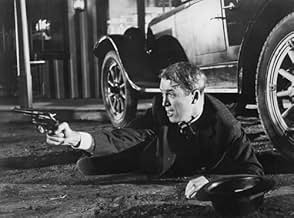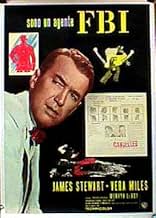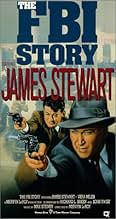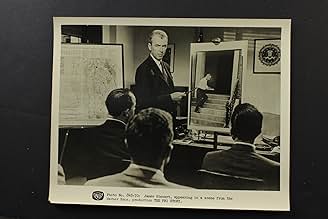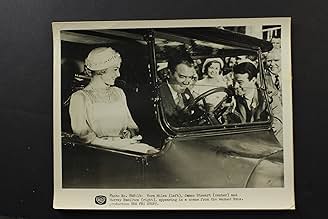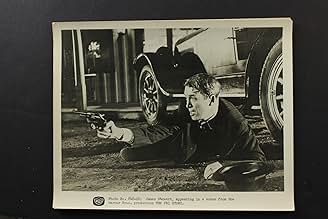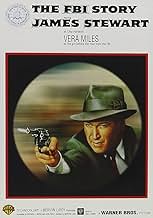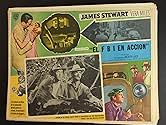CALIFICACIÓN DE IMDb
6.5/10
4.1 k
TU CALIFICACIÓN
Un dedicado agente del FBI recuerda las batallas de la agencia contra el Klan, el crimen organizado, y los espías soviéticos.Un dedicado agente del FBI recuerda las batallas de la agencia contra el Klan, el crimen organizado, y los espías soviéticos.Un dedicado agente del FBI recuerda las batallas de la agencia contra el Klan, el crimen organizado, y los espías soviéticos.
- Dirección
- Guionistas
- Elenco
- Premios
- 1 nominación en total
Ken Mayer
- Casket Salesman
- (as Kenneth Mayer)
Victor Adamson
- Train Passenger
- (sin créditos)
Luana Anders
- Mrs. Graham
- (sin créditos)
- Dirección
- Guionistas
- Todo el elenco y el equipo
- Producción, taquilla y más en IMDbPro
Opiniones destacadas
Entertaining docudrama about the history of the FBI, as told by one agent in particular named Chip (James Stewart). Yes, it's more fiction than fact but it's also a good movie. Judging by some of the reviews here, most of the people hating on the movie seem to be political ax grinders. Obviously J. Edgar Hoover had a hands-on part in the making of this film. He inspires Jimmy to stick with the FBI in an amusingly corny scene. But I'm judging the movie on an entertainment basis, first and foremost, and this movie is entertaining.
The FBI parts are great. The parts dealing with Jimmy's domestic life not so much. Vera Miles is very attractive as a blonde and plays the clichéd but likable wife role well. It's just this part of the movie isn't that interesting and takes up too much time in a movie that goes on for over two hours. Murray Hamilton is good as Jimmy's partner ("I never want to cool off! NEVER!"). If your blood boils about J. Edgar Hoover or you demand absolute historical accuracy from any film depicting real people and events, you'll hate this. But if you like Jimmy Stewart, you'll certainly find things to enjoy here. He's really the whole show. Whether he's taking on the KKK, gangsters, and Commies or just getting ticked off at his kids, he's fun to watch. It's a little long but never boring.
The FBI parts are great. The parts dealing with Jimmy's domestic life not so much. Vera Miles is very attractive as a blonde and plays the clichéd but likable wife role well. It's just this part of the movie isn't that interesting and takes up too much time in a movie that goes on for over two hours. Murray Hamilton is good as Jimmy's partner ("I never want to cool off! NEVER!"). If your blood boils about J. Edgar Hoover or you demand absolute historical accuracy from any film depicting real people and events, you'll hate this. But if you like Jimmy Stewart, you'll certainly find things to enjoy here. He's really the whole show. Whether he's taking on the KKK, gangsters, and Commies or just getting ticked off at his kids, he's fun to watch. It's a little long but never boring.
"The FBI Story" tries to tell the story of the evolution of the FBI over 35 years, through the eyes of a veteran agent, Chip Hardesty (James Stewart). It spins off into several segments covering Hardesty's career. There's a segment on the Klu Klux Klan (with nary an African American in sight), one showing the cheating of native Americans out of their oil leases in Texas and several brief run-ins with the well known gangsters of the 1930s.
Inrerspersed with these episodes are home life interludes where Stewart's character turns into George Bailey ("Its a Wonderful Life" (1946)). He meets and marries Lucy (Vera Miles) and we follow their lives through the birth of three children, a miscarriage, a separation and a war time tragedy.
Told in a documentary style, this film, in my opinion is far too long at 149 minutes. The action sequences, such as they are, are brief and with no character development of the gangsters. They are simply confronted by the FBI and either arrested or gunned down. The Hardesty character is hardly involved in these segments and he does not confront any of the gangsters directly.
The at home sequences while well played, look like something out of "Father Knows Best", the popular TV series of the day. Another thing I found unusual was the fact that Stewart and Miles basically carry the whole film. Other characters appear briefly then either get killed off or disappear altogether. While Stewart and Miles do their best, they hardly seem to have aged 35 years over the course of the story. And there are no name actors to speak of in the supporting cast. Murray Hamilton, Larry Pennell and Nick Adams do appear briefly, but were not that well known in 1959.
James Cagney's "G-Men" (1935) covered the FBI's early years much better.
Inrerspersed with these episodes are home life interludes where Stewart's character turns into George Bailey ("Its a Wonderful Life" (1946)). He meets and marries Lucy (Vera Miles) and we follow their lives through the birth of three children, a miscarriage, a separation and a war time tragedy.
Told in a documentary style, this film, in my opinion is far too long at 149 minutes. The action sequences, such as they are, are brief and with no character development of the gangsters. They are simply confronted by the FBI and either arrested or gunned down. The Hardesty character is hardly involved in these segments and he does not confront any of the gangsters directly.
The at home sequences while well played, look like something out of "Father Knows Best", the popular TV series of the day. Another thing I found unusual was the fact that Stewart and Miles basically carry the whole film. Other characters appear briefly then either get killed off or disappear altogether. While Stewart and Miles do their best, they hardly seem to have aged 35 years over the course of the story. And there are no name actors to speak of in the supporting cast. Murray Hamilton, Larry Pennell and Nick Adams do appear briefly, but were not that well known in 1959.
James Cagney's "G-Men" (1935) covered the FBI's early years much better.
This is an entertaining "history" of the FBI, but it should be viewed as fiction, because that's exactly what it is. What else could it be when J. Edgar Hoover personally approved and had a cameo role in the production. James Stewart is excellent, as usual, and the supporting cast, except for the talentless Vera Miles, is good. Murray Hamilton is especially good in a supporting role as Stewart's partner and best friend. The FBI accomplishments that the film highlights are undoubtedly all true. What is significant is what it leaves out.
One of the most shameful parts of the film is the depiction of the killing of John Dillinger. It is portrayed pretty much as it happened, but no mention at all is made of Melvin Purvis, the Chicago Bureau Chief who headed the operation. Instead, the operation is depicted as if the fictional Chip Hardesty were running it. It has been said that Hoover was jealous of the publicity that Purvis received after Dillinger was killed; Purvis was subsequently transferred to a remote outpost, and shortly afterward left the FBI. This is no doubt why Purvis was never mentioned in the film. But this viewer, at least, paused to think that if Purvis was treated this way, what about all the agents who conducted all the other operations depicted in the film. Were they also completely ignored and replaced by the fictional Hardesty.
The film is probably accurate in its portrayal of FBI activity up through the end of WWII. However, after that point, the film would have us believe that the only threat facing the US came from international communism, which is no doubt what Hoover believed. Never mind the Mafia. Never mind the lynchings that were still going on in the South. Never mind that blacks were being intimidated to keep them from voting in much of the South. I don't know if the FBI had started wiretapping Martin Luther King by the time this film was made, but if not, it wasn't very long afterward that it started.
As I said at the outset, this is pretty good entertainment, but it should be viewed as the sanitized fictionalization that it is.
One of the most shameful parts of the film is the depiction of the killing of John Dillinger. It is portrayed pretty much as it happened, but no mention at all is made of Melvin Purvis, the Chicago Bureau Chief who headed the operation. Instead, the operation is depicted as if the fictional Chip Hardesty were running it. It has been said that Hoover was jealous of the publicity that Purvis received after Dillinger was killed; Purvis was subsequently transferred to a remote outpost, and shortly afterward left the FBI. This is no doubt why Purvis was never mentioned in the film. But this viewer, at least, paused to think that if Purvis was treated this way, what about all the agents who conducted all the other operations depicted in the film. Were they also completely ignored and replaced by the fictional Hardesty.
The film is probably accurate in its portrayal of FBI activity up through the end of WWII. However, after that point, the film would have us believe that the only threat facing the US came from international communism, which is no doubt what Hoover believed. Never mind the Mafia. Never mind the lynchings that were still going on in the South. Never mind that blacks were being intimidated to keep them from voting in much of the South. I don't know if the FBI had started wiretapping Martin Luther King by the time this film was made, but if not, it wasn't very long afterward that it started.
As I said at the outset, this is pretty good entertainment, but it should be viewed as the sanitized fictionalization that it is.
When I was a very young teen, I saw this in the theater and was just awed. The different segments were very dramatic and stayed with me for decades.
So after a long, long absence, seeing this again in the late '90s turned out to be a major disappointment. As a kid, this movie was exciting, but it sure isn't now. It's two-and-a-half hours long and moves pretty well but too much time is spent on the marriage of Jimmy Stewart-Vera Miles ("Chip and Lucy Ann Hardesty").
As one who watches a lot of modern- day crime movies, it was odd to see one with absolutely no profanity in it and very little blood, but that's because it's a 1959 film. We see the FBI cracking down on the KKK, anti- Native Americans, the Communists, spies, etc. Some of those parts are exciting, but nothing like when it came out almost 50 years ago. Now, it's almost ho-hum stuff.
For me now, this movie is more of a nostalgia piece than anything else. Frankly, I doubt if I would watch it again.
So after a long, long absence, seeing this again in the late '90s turned out to be a major disappointment. As a kid, this movie was exciting, but it sure isn't now. It's two-and-a-half hours long and moves pretty well but too much time is spent on the marriage of Jimmy Stewart-Vera Miles ("Chip and Lucy Ann Hardesty").
As one who watches a lot of modern- day crime movies, it was odd to see one with absolutely no profanity in it and very little blood, but that's because it's a 1959 film. We see the FBI cracking down on the KKK, anti- Native Americans, the Communists, spies, etc. Some of those parts are exciting, but nothing like when it came out almost 50 years ago. Now, it's almost ho-hum stuff.
For me now, this movie is more of a nostalgia piece than anything else. Frankly, I doubt if I would watch it again.
This starts almost like a high school educational film about the FBI. The narration is actually veteran agent Chip Hardesty (James Stewart) doing a lecture. He recounts the story of the FBI starting from its early haphazard days in 1924. He marries pretty librarian Lucy Ann Ballard (Vera Miles). Over the years, he investigates the Ku Klux Klan, the Osage Indian murders, various gangsters, Nazis in Brazil, and communist spies.
This is a sympathetic look at the FBI approved by Hoover. The opening is like a school educational film which is par for the course. It's an old fashion take on the federal police force. It definitely doesn't indulge in any controversies against the FBI. There may violence by the KKK but there is no mentions of lynching. They round up enemy aliens during WWII but they don't talk about the thousands of innocent citizens in internment camps. It's also episodic in nature. The plot doesn't flow as much as it continues on and on. This is definitely a movie where Hollywood submits to authority.
This is a sympathetic look at the FBI approved by Hoover. The opening is like a school educational film which is par for the course. It's an old fashion take on the federal police force. It definitely doesn't indulge in any controversies against the FBI. There may violence by the KKK but there is no mentions of lynching. They round up enemy aliens during WWII but they don't talk about the thousands of innocent citizens in internment camps. It's also episodic in nature. The plot doesn't flow as much as it continues on and on. This is definitely a movie where Hollywood submits to authority.
¿Sabías que…?
- TriviaTwo FBI agents were on the set at all times.
- ErroresJennie forgets her speech at a mid-term Honor Society event. When her father comforts her in the family car a few moments later, the cherry blossoms are in bloom; this usually occurs in early April in Washington (DC). However, after they leave the car with the radio still on, a news bulletin breaks in, announcing the attack on Pearl Harbor, which took place on December 7, 1941. No cherry blossoms would have been in bloom then, nor would the weather have been mild enough as depicted in the accompanying scenes.
- Citas
[first lines]
John Michael Hardesty: [narrating] Webster's International Dictionary defines murder as the unlawful taking of human life by another human being. On a November evening in 1955, the definition became obsolete. A mass murder was being planned.
- ConexionesEdited from Débiles y poderosos (1954)
Selecciones populares
Inicia sesión para calificar y agrega a la lista de videos para obtener recomendaciones personalizadas
- How long is The FBI Story?Con tecnología de Alexa
Detalles
- Fecha de lanzamiento
- País de origen
- Idioma
- También se conoce como
- The FBI Story
- Locaciones de filmación
- Productoras
- Ver más créditos de la compañía en IMDbPro
- Tiempo de ejecución2 horas 29 minutos
- Relación de aspecto
- 1.66 : 1
Contribuir a esta página
Sugiere una edición o agrega el contenido que falta

Principales brechas de datos
What is the French language plot outline for El F.B.I. en acción (1959)?
Responda

